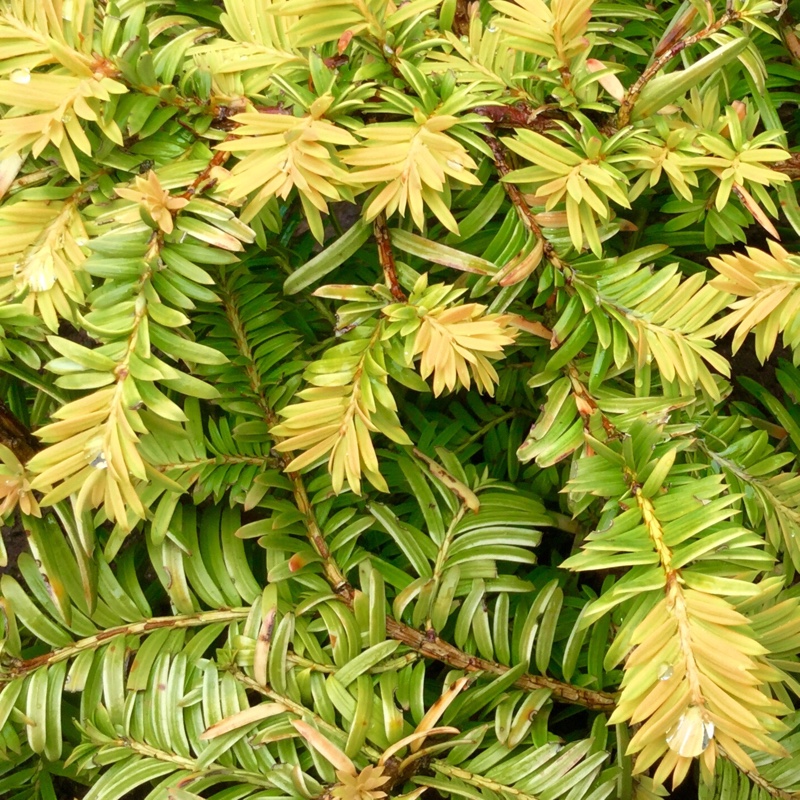
Taxus baccata 'Corley's Coppertip'
English Yew 'Corley's Coppertip'
Taxus baccata is a medium sized coniferous evergreen tree. It has narrow dark flat green leaves which are arranged in two rows on stems. It can grow up to 12 metres tall (although older specimen plants have been known to reach taller heights) and it can develop a thick trunk covered in scaly brown bark. It is a slow growing plant, taking a number of years before reaching its mature height. As a conifer, it produces seed cones (albeit a modified version) which rather than a hard woody cone looks instead like a fleshy berry-like structure called an aril, which is red in colour. The plant is toxic and should not be ingested. 'Corley's Coppertip' is a small upright yew which has copper tipped coloured foliage, and red arils
Contributed by @crestiesneuk
-
Full sun to deep shade
-
Occasional watering
-
Full Frost Hardy: 5F (-15°C)
-
Free draining
Common name
English Yew 'Corley's Coppertip'
Latin name
Taxus baccata 'Corley's Coppertip'
type
Coniferous tree
family
Taxaceae
ph
5.0 - 8.0 Acid - Neutral
Plant & bloom calendar
-
Best time to plant
-
When the plant will bloom
full grown dimensions
 8.00 M
10.00 M
8.00 M
10.00 M
Taxus baccata 'Corley's Coppertip'
Taxus baccata is a medium sized coniferous evergreen tree. It has narrow dark flat green leaves which are arranged in two rows on stems. It can grow up to 12 metres tall (although older specimen plants have been known to reach taller heights) and it can develop a thick trunk covered in scaly brown bark. It is a slow growing plant, taking a number of years before reaching its mature height. As a conifer, it produces seed cones (albeit a modified version) which rather than a hard woody cone looks instead like a fleshy berry-like structure called an aril, which is red in colour. The plant is toxic and should not be ingested. 'Corley's Coppertip' is a small upright yew which has copper tipped coloured foliage, and red arils
Flowering Season
From Mid Winter TO Late Winter
Small nondescript flowers form before the seeds develop and appear in fleshy fruit like structures called arils in the late summer. All parts of the seed are poisonous.
Planting Season (Spring)
From Early Spring TO Mid Spring
Plant out pot grown specimens in soil that has had well rotted compost or manure added and dug in.
Propagate by Seed
From Early Spring TO Mid Spring
Sow seed when it is ripe and keep outside in a cold frame. Generally, only straight species can be raised by seed as Cultivars do not often come true from seed and will experience variation from the mother plant.
Propagate by Semi-ripe Cuttings
From Late Summer TO Mid Autumn
Semi-ripe cuttings are taken from the current years growth from late summer to mid autumn the bottom of the cuttings is hard and soft on the top. With a sharp knife take a cutting of about 14 cms, remove lowest leaves, dip end into rooting hormone, and place round the edge of a pot filled with a suitable compost, water well, they must remain moist till rooted, place under glass but in semi shade.
Planting Season (Autumn)
From Late Summer TO Mid Autumn
Plant out pot grown specimens in soil that has had well rotted compost or manure added and dug in.
Propagate by Softwood Cuttings
From Mid Spring TO Early Summer
Take soft wood cuttings in spring to early summer. Cleanly cut up to a 10cm long stems, remove lower leaves and pinch the tip out, dip the stem into rooting hormone, fill a container/pot with suitable compost, make holes around the edge of it and plant the cuttings, water in well, cover with a polythene bag and place somewhere warm, lake the bag off twice a week to air the cuttings. Keep the cuttings moist until well rooted.Harden off when well rooted and pot on into individual pots increasing the airing to let the leaves to develop. Remove rotten, dying or dead cuttings regularly.









